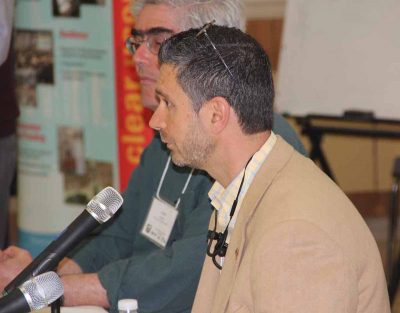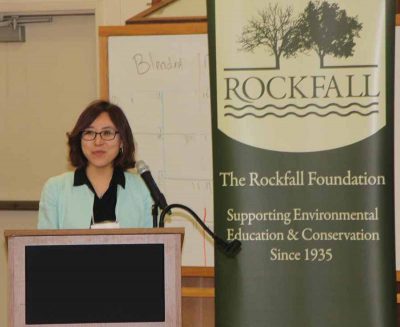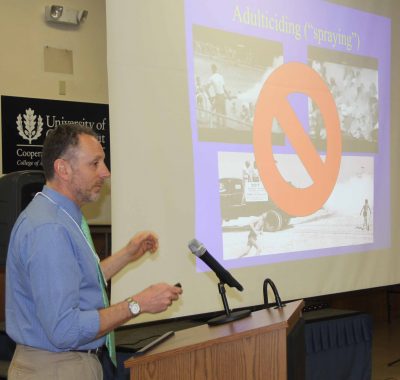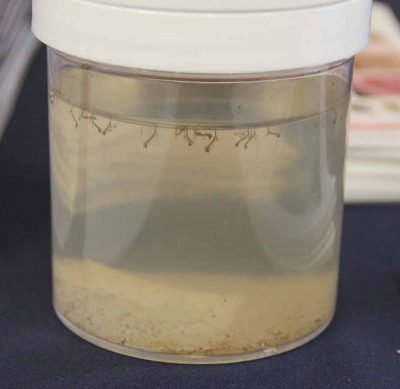
Story and photos by Judy Benson
For anyone who assumes mosquitoes are just a nuisance, Michael Pacucilla has a sobering message.
The director of health for the East Shore District Health Department, he shared a personal story about the serious consequences that can result from a bite by one of these ubiquitous flying insects.
“I had a family member hospitalized with West Nile virus, and they still have health effects from it,” said Pacucilla, whose district covers East Haven, Branford and North Branford. “The disease is significant. We really do need to do a better job with mosquito control.” Other critical elements are public education about maintaining yards to reduce mosquito breeding areas and raising awareness about mosquito-borne diseases and personal protective measures.
Pacucilla made his remarks as part of a panel session during the Climate Adaptation Academy/Rockfall Symposium on April 12 that covered three seemingly unrelated aspects of landscape design and maintenance. In reality, effective mosquito control, septic system monitoring and adoption of green infrastructure techniques are crucial aspects of land use planning and retrofit projects for municipalities and developers to consider as climate change affects their communities, speakers said.
The workshop, sponsored by Connecticut Sea Grant, UConn CLEAR, the UConn Department of Extension and the Rockfall Foundation, took place at the Middlesex County Extension Center in Haddam. Titled “Site Development and Green Infrastructure for Changing Weather Patterns,” it drew about 35 land use professionals.

Leading off the workshop was Sohyun Park, assistant professor in the UConn Department of Plant Science and Landscape Architecture. Replacing traditional stormwater drainage systems with green infrastructure – which mimics natural systems to allow water to infiltrate into the ground – is not only better for the environment, she said. It can also make communities more resilient to the increasing precipitation of climate change, provide wildlife habitat and create aesthetically pleasing spaces that enhance people’s mental well-being, she said. Components of green infrastructure can include rain gardens, bioswales, green roofs, detention ponds, tree box filters and riparian buffers, among others.
She also urged municipal leaders to construct systems that cross town boundaries to incorporate connected waterways as much as possible.
“Collaboration is a key part of green infrastructure,” she said. “The key message I’m trying to deliver is that green infrastructure is not just for stormwater management, but it also has a lot of other functions and benefits. We need to take a holistic concept, to think of our landscape as a whole instead of piecemeal.”
During the panel discussion, she added that control of mosquitoes and other pests and proper functioning of septic systems should also be factored into land use plans for green infrastructure.
Jose Amador, professor in the College of the Environment and Life Sciences at the University of Rhode Island, addressed how septic systems are being impacted by climate change. Due to increasing precipitation and sea level rise, the water table in many areas is rising into the drain fields of many septic systems, decreasing their effectiveness at treating pollutants.
“The drain field is the area most affected by climate change,” he said.
He noted that septic systems, while usually unseen and often forgotten, are in fact an important part of an area’s hydrology, so the effects can be widespread when they don’t function properly.
“They are part of the water infrastructure, and we tend to just ignore that,” he said. “They can be a source of contamination, when the water is moving through too fast or too slow. They are not perfect.”
Both the amount and the temperature of water infiltrating a septic system can impact the effectiveness of treatment, he said. Because climate change is reducing the amount of oxygen in the soil, beneficial bacteria that break down contaminants are reduced.
Severe storms becoming more frequent with climate change are also causing “catastrophic failures” of septic systems, especially in coastal areas.
He urged municipal officials to pay more attention to the septic systems in their towns.
“If you’re a regulator, you want to take a look at where your septic systems are and which ones are at risk of being impacted by climate change,” he said. “We need to make people accountable for the treatment level or performance of their treatment system.”
The third presenter, Roger Wolfe, focused on mosquitoes and mosquito-borne diseases, which are increasing as temperature and precipitation levels rise.
“Last year was a bad year for West Nile virus,” said Wolfe, mosquito management coordinator for the Connecticut Department of Energy and Environmental Protection. “We’ve had it here since 1999, and it’s here to stay.”
From 2000 to 2018, there were 157 human cases of the virus, mostly in Fairfield, New Haven and Hartford counties. Eastern equine encephalitis, while less common, has also been appeared regularly in the state.
The key to mosquito control, he said, is to keep properties clean of standing water, which can exist in backyard pools, aging stormwater basins and artificial wetlands without proper drainage. To reduce mosquito populations, his office advocates restoring tidal flows to marsh areas, replacing undersized culverts and reopening wetland channels to allow access for mosquito-eating fish. Larvacides and biological controls are also used selectively, he said.
Slides from the presentations will be posted at: https://www.rockfallfoundation.org/about-us/rockfall-symposia/
Judy Benson is the communications coordinator at Connecticut Sea Grant.

